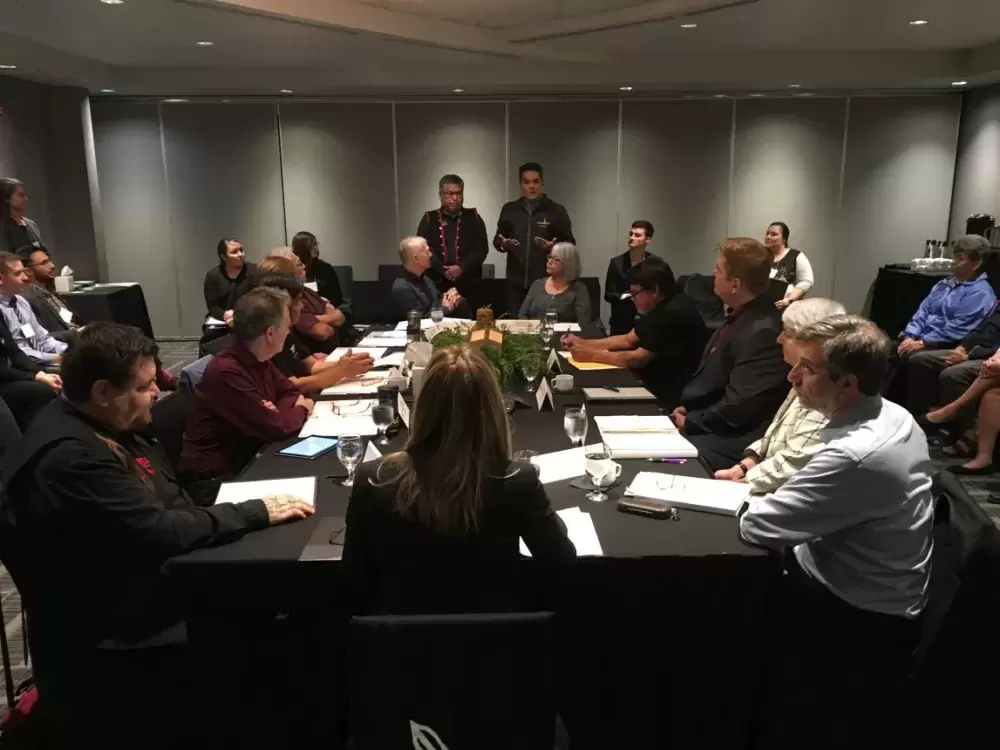With a number of timely subjects on the table, Maa-nulth nations had their annual government-to-government leaders forum on Nov. 13 in Ucluelet.
The Maa-nulth First Nations and British Columbia Leaders Forum was created as a result of a commitment made when the treaty was implemented on April 1, 2011. In attendance to the second annual meeting were leaders from the Maa-nulth Nations, which include Uchucklesaht, Yuulu?il?ath?, Toquaht, Ka:’yu:’k’t’h’/Chek’tles7et’h’ and Huu-ay-aht, and representatives from the provincial government.
Toquaht Chief Anne Mack said it’s encouraging to have so many ministers present around the table and that shows the province is taking their government-to-government meetings serious. Mack acknowledged the progress the province has made recently in adopting the UNDRIP legislation. Although this is a monumental act, the Maa-nulth nations are still dealing with several challenges since implementation of the treaty.
The biggest of these challenges is financial, Mack explained. She pointed out that the colonial mind is still alive and well and this means both parties at the table must work harder to educate front-line workers on how to eliminate this from their belief system.
Scott Fraser, B.C.’s minister of Indigenous Relations and Reconciliation used the Nuu-chah-nulth principle of Hišuk ma c̕awak, explaining that he believes everything is connected and one. He expects that the collaborative government-to-government forums will continue to get better year after year.
George Heyman, minister of Environment and Climate Change Strategy, talked about the importance of including Indigenous knowledge when the province draws up climate change initiatives. He acknowledged that CleanBC, a provincial renewable energy initiative, could have consulted First Nations more in Phase One, but that they will learn from this and reach out more to the communities. He also stressed the importance of creating economic opportunities for First Nations.
Huu-ay-aht Chief Councillor Robert Dennis brought up how much removing First Nations people from the land has changed the ecosystem where they traditionally lived. He stressed the importance of returning the balance by bringing Indigenous people back to their land.
Uchucklesaht Councillor Wilfred Cootes said one big obstacle they must overcome is the Collaborative Fiscal Financing Agreement. After lengthy negotiations, it is the belief of the Maa-nulth nations that B.C.’s offer of status quo funding would equal 0.3 to 0.6 per cent of federal funding for each year under the FFA. This offer was accepted under protest, but the Maa-nulth nations are still waiting for B.C. to negotiate more appropriate funding.
He wrapped up by stating that it is the hope of the Maa-nulth nations that the relationship they have with the province be repaired and a new agreement reached, because when First Nations succeeds everyone succeeds. Fraser and Finance Minister Carol James were both supportive of this statement, adding that it’s not just about giving money but about creating opportunities to build a strong economy with benefits for all.
Ka:’yu:’k’t’h’/Chek’tles7et’h’ Legislative Chief Kevin Jules explained to the ministers that road access to the Treaty Settlement Land needs significant upgrades in order to allow the nations to fully utilize the rights and benefits of the treaty. He pointed out that safety concerns mean that the discussion needs to be how the improvements will be made. It can no longer be about whether or not it can be done.
Jules asked that B.C. commit to chip seal the Bamfield Road, increase the reliability and safety of the Fair Harbour Road, and increase road safety overall.
Minister of Transportation and Infrastructure Claire Trevena said they are aware of the issues are not ignoring them. She said the ministry is interested in working on relationship building and possible partnerships with the nations to help address the road concerns.
Maa-nulth natural resources consultant Ron Frank brought groundwater to the table, pointing out that the Maa-nulth Treaty makes provisions for addressing groundwater that requires the province attempt to reach an agreement with Maa-nulth. The province was regulating groundwater in February 2016, but despite this, came to the table in 2018 unprepared to negotiate.
The Maa-nulth nations are concerned because they are the most underfunded self-government in Canada, and yet they are expected to address groundwater on their own now. Frank asked that a resolution to these issues be reached in a timely fashion. Sutherland said he is more than aware of the challenges facing the group, but together they can find money to meet treaty obligations. Fraser also reassured the nations that he will advocate for more funding.
Frank also pointed out that when it comes to wildlife, the treaty nations have many common struggles, and the key is to work collaboratively to find ways that everyone will benefit.
He presented a detailed list of 11 specific recommendations, pointing out that the key is an increase in human, financial, and infrastructural resources. After some discussion, everyone agreed to work on the 11 recommendations and bring a report back to the next government-to-government forum in 2020.
At the end of the meeting each representative was given a chance to offer closing statements. The common thread in all their comments was the desire to work together to ensure the best interest of the Maa-nulth nations is the focus.







